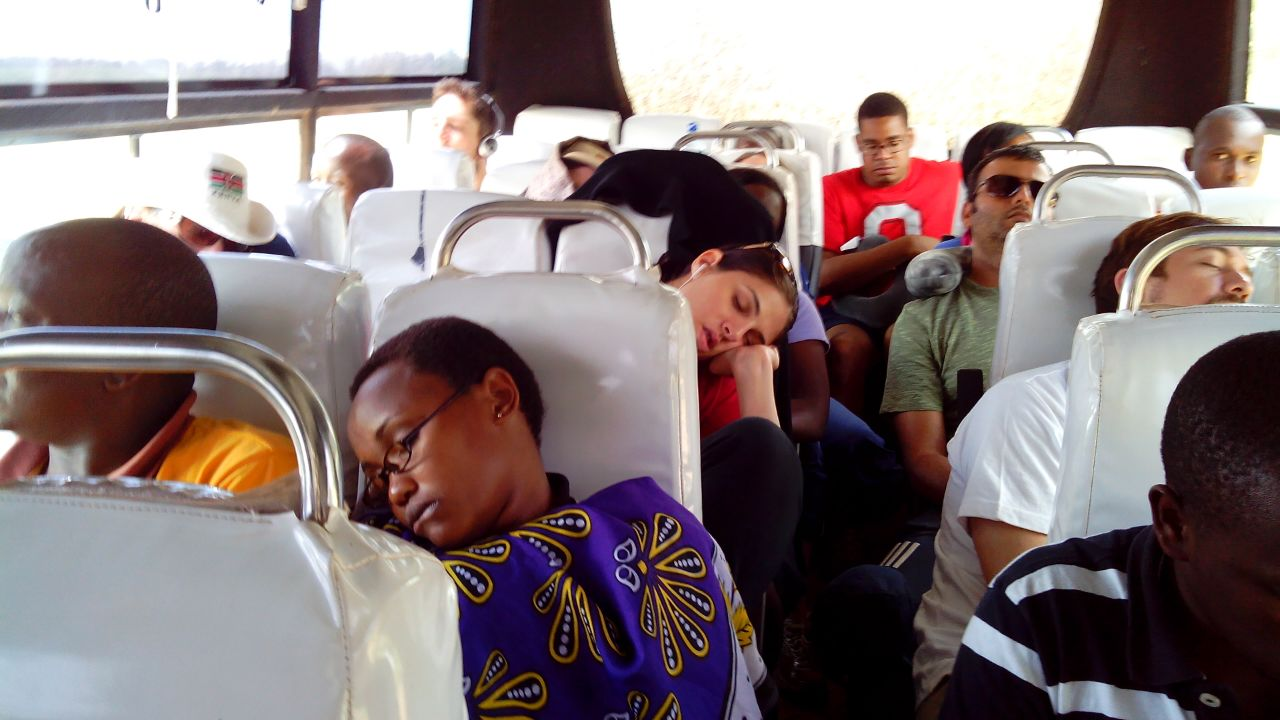Bus Sleepers Association:The Reality of 9-5 workers

The Bus Is the New Bedroom
Most 9-to-5 workers operate with a strange but very real sleep formula, four or five hours at home and the remaining three or four hours inside a moving bus. For some workers, the bed at home is just “Part One” so “Part Two” happens inside a Dfanfo, BRT, korope or staff bus. You will see them in the morning with eye bags, rushing out of the house by 5:00 a.m. Praying silently that they’ll find a seat by the window so the breeze can ginger sleep. By the time the bus hits the express, they are already gone.
For many people, morning bus sleep is the only rest they can truly count on. Their houses are too noisy, their alarms too early, and their daily workload too overwhelming. The gentle vibration of the engine, the cold morning breeze sliding through windows, and the soft hum of commuters breathing around them create a strange kind of comfort. Even the fear of missing their bus stop can’t outweigh the exhaustion dragging their eyelids shut. In those moments, the bus becomes more than transportation, it becomes a lifeline.
Those who manage to stay awake on the bus often end up regretting it. They watch their colleagues fall into deep sleep, heads rolling left and right, hands resting on bags like pillows. Some workers even plan their sleep ahead, they choose a particular seat because it allows them to lean, or they time their sleep based on when the conductor stops shouting. The city keeps moving, the sun keeps rising, but inside those buses, dreams and responsibilities weave together. And by the time they arrive at work, many have already completed half their required sleep, not in their beds, but on the road.

The Staff Bus Advantage
For employees with staff buses, life is softer, at least in the world of mobile sleep. These buses offer rare privileges, predictable routes, familiar faces, and the sweet assurance that nobody will shout “enter with your change o!” at 5:20 a.m. The moment they enter the staff bus, they transform from stressed workers into passengers ready to float into dreamland. Some people even bring small scarves to cover their faces, because the sleep hits differently when you know you are safe among colleagues. In the quiet hum of the company bus, they fall asleep almost instantly, trusting that the driver knows exactly where to drop them.
Those who remember to draw the curtains enjoy luxury, darkness that shields their tired faces from the outside world, but the unlucky ones who forget become unintentional entertainment for other road users. As the staff bus drives past traffic, outsiders see employees sleeping with mouths open, faces twisted in peaceful confusion or heads bouncing lightly against the window. People outside laugh, but inside that bus, nobody cares. They are too exhausted. All they want is one last stretch of sleep before the day begins.
In the staff bus, sleeping is not shameful, it is a culture. Everyone does it. In fact, the few who stay awake often feel like the odd ones out. There are those who sleep through the entire journey, those who sleep in episodes, and those who snore softly but get forgiven because everyone understands. Some even set alarms on their phones, not to wake up for work, but to wake up before their colleagues catch them snoring like a mini generator. The staff bus may not be perfect but in the world of 9-to-5 workers, it is the closest thing to a moving home.
The Public Transport Warriors
Meanwhile, the real heroes of mobile sleep are the public transport warriors. These are the people who sleep inside danfo, BRT, korope, bolt ride-shares, and every other form of public transportation known to Nigerians. Their sleep is not protected by curtains, by silence, or by the comfort of familiar colleagues. Their sleep must survive conductors banging metal, drivers yelling, buses shaking violently on potholes, passengers arguing over ₦50 change, and early morning preachers shouting scriptures. Yet somehow, these people still sleep and they sleep deeply.
Their heads fall forward and backward, bouncing with every pothole. They sleep with bags hugged to their chest like babies. Some even sleep with their phones in their hands, trusting that angels of public transport will guard their belongings until they reach their destination. The funniest part, however, is when they wake up suddenly, confused, looking around as if teleported to another universe. They wipe their faces, pretend they were thinking deeply, then doze off again as the bus continues.
@olaoluwwwa perfectly captured this fear on X: “I always sleep on the bus during my commute in the morning and wake up just before my stop. I'm low-key scared that one day I'll sleep and miss my stop.”
Sometimes, this deep sleep leads to legendary mistakes. Some workers sleep past their bus stop and wake up at the last stop, staring at the driver in shock, Others rely on strangers to wake them, tapping someone gently and begging to help me wake up when the bus gets to a particular location But the person they begged is also tired and fighting sleep, so both end up sleeping and overshooting their stops together. In public transport, survival sleep is unpredictable, unplanned but always hilarious, if only anyone were awake to notice in the early morning. Sometimes, commuters themselves sum up the absurdity in a single sentence: “The sleep I slept in the bus this morning >>>>>” tweeted @mide_kiki.
Even in these chaotic conditions, bus sleep remains an essential, if slightly embarrassing, ritual. It is a shared experience, a badge of survival, and proof that in the daily grind of Nigerian 9-to-5 life, every spare moment of rest counts.

The Return Journey
After closing hours, the cycle repeats itself like a daily soap opera. Workers walk out of their offices exhausted and emotionally finished, carrying laptops, bags, and silent frustration. The moment they enter their buses, sleep taps them lightly on the shoulder and they surrender once again. Some people sleep even before the bus starts moving, their bodies shutting down like phones on 1%. Those who didn’t complete their morning sleep do so now. Those who completed it still sleep again, and those who swore they wouldn’t sleep find themselves dozing within minutes.
Evening sleep is different. It is deeper, heavier, and sometimes more embarrassing. People tilt to the side, accidentally resting on a stranger's shoulder, only to wake up and pretend nothing happened. Some wake up briefly, check their phones, and sleep again like they are continuing a paused movie.The staff bus sleepers often forget themselves entirely. Their colleagues know who snores, who drools, who talks in their sleep, and who must never sit near the window because the breeze will knock them unconscious in under five minutes.
Public transport sleepers in the evening face an even tougher experience. The buses are hotter, the traffic is worse, and the conductor is louder. Yet they still manage to sleep. Some restaurants and supermarkets become temporary waking points, people open their eyes suddenly, realize where they are, then sleep again.When they finally get home, one dramatic realization hits them: despite all the sleep they slept that day, morning, evening, afternoon , they are still tired.
Recommended Articles
There are no posts under this category.You may also like...
Super Eagles Fury! Coach Eric Chelle Slammed Over Shocking $130K Salary Demand!
)
Super Eagles head coach Eric Chelle's demands for a $130,000 monthly salary and extensive benefits have ignited a major ...
Premier League Immortal! James Milner Shatters Appearance Record, Klopp Hails Legend!

Football icon James Milner has surpassed Gareth Barry's Premier League appearance record, making his 654th outing at age...
Starfleet Shockwave: Fans Missed Key Detail in 'Deep Space Nine' Icon's 'Starfleet Academy' Return!

Starfleet Academy's latest episode features the long-awaited return of Jake Sisko, honoring his legendary father, Captai...
Rhaenyra's Destiny: 'House of the Dragon' Hints at Shocking Game of Thrones Finale Twist!

The 'House of the Dragon' Season 3 teaser hints at a dark path for Rhaenyra, suggesting she may descend into madness. He...
Amidah Lateef Unveils Shocking Truth About Nigerian University Hostel Crisis!

Many university students are forced to live off-campus due to limited hostel spaces, facing daily commutes, financial bu...
African Development Soars: Eswatini Hails Ethiopia's Ambitious Mega Projects

The Kingdom of Eswatini has lauded Ethiopia's significant strides in large-scale development projects, particularly high...
West African Tensions Mount: Ghana Drags Togo to Arbitration Over Maritime Borders

Ghana has initiated international arbitration under UNCLOS to settle its long-standing maritime boundary dispute with To...
Indian AI Arena Ignites: Sarvam Unleashes Indus AI Chat App in Fierce Market Battle

Sarvam, an Indian AI startup, has launched its Indus chat app, powered by its 105-billion-parameter large language model...